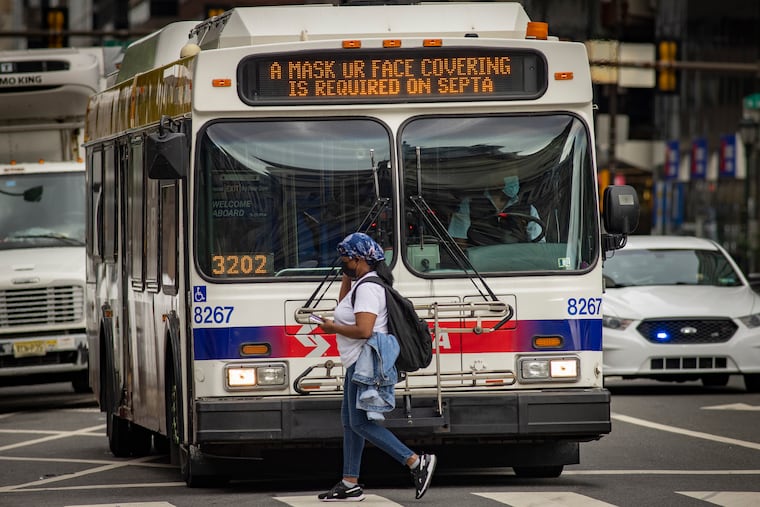SEPTA bus riders are frustrated by persistent delays. Officials say a shortage of drivers is to blame.
The regional transit agency was not able to hire at the rate of attrition and has to play catch up.

For weeks, SEPTA’s real-time online bus service status page has been speckled with red triangles warning riders of delays on many routes “due to an operator shortage.”
The transit agency is down 105 bus operators, officials said. Austerity measures during last year’s coronavirus shutdowns, including a four-month hiring freeze, have hampered SEPTA’s ability to keep up with attrition.
As a result, thousands of frustrated riders wait longer at bus stops.
And when operators scheduled for duty call in sick or have family emergencies, regular occurrences in a workforce of more than 2,600 people, managers in SEPTA’s nine bus garages have to scramble.
“Customers are understandably frustrated,” said Scott Sauer, the agency’s assistant general manager for operations. “The bus is a lifeline to their job, to their doctor’s appointments.”
Schools, public transit systems, and charter companies across the country are having a hard time finding enough bus operators. Massachusetts Gov. Charlie Baker this week ordered 250 National Guard troops to drive yellow school buses. Philadelphia’s school district has asked the state’s National Guard and Amazon for help.
» READ MORE: Pa. National Guard, Amazon could help solve Philly’s bus crisis, Superintendent Hite says
St. Louis Metro is offering $2,000 signing bonuses to new bus and light-rail operators, as well as some mechanic positions. Detroit’s transit system, which serves the city and many suburbs, is cutting some bus routes.
Meanwhile, SEPTA is authorizing overtime pay — and in some cases mandating that drivers work overtime — to try to minimize disruptions in bus service. Overtime pay had been restricted until recent months.
Sauer, who began his career as a trolley operator, said relief is on the way. On Monday, 30 bus-operator recruits are scheduled to begin training, he said. Another group of 30 begins classes Oct. 11. It may take six months to a year before “we can get back to even,” Sauer said.
SEPTA has been hiring some drivers during the pandemic, but the number was limited for months to about 10 students at a time to maintain safe social distancing. Training, which includes classroom work and driving time, takes five to six weeks, Sauer said. New operators need to learn all the routes run out of the bus garage to which they will be assigned. That can be up to 20 routes.
And all along, SEPTA continued to lose an average of 22 operators per month who retired, resigned for other opportunities, or were fired. “We lost a lot of ground,” Sauer said.
Delays are not often in the same places along a route, or at the same times, officials said. SEPTA focuses its efforts on routes with less frequent service, where a missing bus compounds delays for riders, and in the late night/early morning hours, Sauer said.
“I don’t remember it ever being this bad,” Nat Lownes, of the Philly Transit Riders Union, said about delays on bus routes. In many ways, he said, the driver shortage is a “crisis SEPTA management has created” by misjudging how many operators it would need and keeping strict limits on overtime until recent months.
Lownes said some of his friends who are bus operators tell him they’re worn out with the demands of the job, which include enforcing federal mask regulations and often dealing with irate riders. “It can be brutal,” he said.
Yet SEPTA says it has a sizable pool of people interested in becoming bus operators.
The base starting salary for bus and trolley operators, not including overtime, is $38,979, at an hourly rate of $18.74. With four or more years of experience, operators reach the top of the hourly pay scale, $31.64, which amounts to a $65,811 base salary.
The job comes with a pension, a rarity in most fields, and is stable, though operators must deal with changing schedules, including split shifts, before they have enough seniority to get the most desirable assignments.
“People understand that the struggle is as real for us as well as for everyone else, but that doesn’t make it any less frustrating,” Sauer said. “We’re trying to solve the problem. It’s not going to be a quick fix but I think our customers will see improvement gradually.”